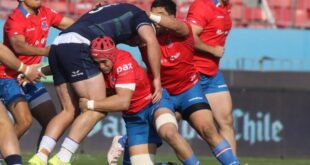Uruguay’s return to the Rugby World Cup in 2015 ends a twelve year absence. Getting to the World Cup required intercontinental matches firstly against the USA and secondly against Hong Kong before reaching the final against Russia. The home and away series between Uruguay and Russia was, at the time, between the 19th and 20th ranked teams in the world.
Despite missing out Russia remain in the top 20 and has since be joined by Spain who sit one place ahead of Uruguay in 21st position. Behind Uruguay in 22nd is Namibia who qualified directly for the Rugby World Cup as Africa 1.
Based on rankings Namibia is very fortunate to be playing in the World Cup and questions remain unanswered as to why the system remains in place despite African qualifiers having never won a World Cup match. With a history demonstrating similarities it may be time to re-think repechage.
2015 – With Russia having faced Uruguay in the Final Place Play-Off series on September 27 and October 11 2014 it meant the winner of repechage was not from either Asia or Africa. The same has been true of all World Cup qualification campaigns since repechage was introduced ahead of the 1999 tournament.
Uruguay reached the Final Place Play-Off despite having been ranked in the world’s top 20 and having gone through the South American regional qualification phase without losing a match. Unlike all other World Rugby defined regions the South American winner does not qualify directly for the Rugby World Cup.
Indeed Uruguay faced the USA home and away and caused the North Americans problems in the first match which was a 27-27 draw before being over powered in Atlanta with the Eagles completing a 32-13 victory. In being required to face the USA Uruguay was also playing against an official Tier Two member. Asian runner-up Hong Kong did so against Japan as did Europe’s third placed side Russia against Georgia and Romania. Namibia, in contrast qualified after playing exclusively against Tier Three nations.
Namibia qualified directly despite losing against Madagascar in 2012 and Kenya in 2014. Neither country has qualified for a Rugby World Cup. Joining them in the 2014 Africa Cup, which saw Namibia qualify, was Zimbabwe who featured in the first two Rugby World Cups. Zimbabwe finished second ahead of Kenya who also won two out of three matches. Zimbabwe was consequently confirmed as Africa 2 and secured a repechage Semi Final against Russia.
Meeting Uruguay in the second Semi Final was Hong Kong who had beaten all but Japan in the 2014 Asian Five Nations to be Asia 2. As the higher ranked sides Russia and Uruguay were given home advantage in the one-off Semi Finals and they both won with Russia being challenged but triumphing 23-15 while Uruguay came out on top 28-3 against Hong Kong.
Although the format used for determining repechage qualifiers has been different in earlier Rugby World Cups the teams that have finished European and American qualification as the top ranked teams without direct qualification have been the sides to secure qualification via intercontinental play-offs. World Rugby therefore must address the qualification model to conclude whether or not a fairer system can be established.
Previous qualification models have varied but have nonetheless all seen Africa and Asia lacking the ability to get past the likes of Portugal, Romania, Russia, Tonga and Uruguay. Is it time to re-think repecharge? Could a new system be put in place ahead of the qualification process for Rugby World Cup 2019? As seen in previous World Cups the qualification process has changed regularly and therefore future alterations are entirely plausible.
2011 – Policy changes by the Federatia Romana de Rugby (FRR) after Rugby World Cup 2007 saw the union limiting opportunities to those who were playing their rugby at home. Those based abroad were therefore excluded from international duty and the consequence was very nearly disastrous as Romania lost at home against Russia and Portugal in 2009.
A depleted Romania meant Russia collected more competition points and finished second, behind Georgia, to qualify directly for Rugby World Cup 2011. Romania recovered to finish in third position with six victories from ten matches, just one more than that of Portugal. The turn-around, which enabled Romania to qualify, was due to the union enabling foreign based players to play for the test team again and after defeating Ukraine home and away Romania entered repechage.
Like in 2015 the repechage process featured runners-up from Africa and Asia in addition to the third placed sides from Europe and the Americas. The higher ranked sides from Europe and the Americas hosted the matches with there being no return fixtures. Consequently Romania hosted Tunisia (Africa 2) and Uruguay took on Kazakhstan (Asia 2). The 56-13 and 44-7 results saw Romania and Uruguay advance to the Final Place Play-Off which Romania won on aggregate after the teams had competed to a 21-21 draw in the opening match in Montevideo.
2007 – Rugby World Cup 2007 featured a different format with there being two places for repechage qualifiers. Named Repechage 1 and 2 they were divided in a differing manner which saw the winner of Africa 2 v Europe 3 advancing to face Americas 4 in the final. With Argentina having to qualify Uruguay was Americas 4 rather than 3 while Tonga qualified as repecharge 2 with an 85-3 win over South Korea.
Portugal faced Uruguay in the repechage 1 final after the Europeans defeated the North Africans by scorelines of 10-5 and 16-15. Portugal then secured a maiden appearance and a Rugby World Cup with a victory by one point, on aggregate over Los Teros. Having won 12-5 in Lisbon Uruguay recovered to win 18-12 but paid the price for having had second-rower Juan Bado red-carded early in the match.
2003 – Similar to the Rugby World Cup 2007 qualification process there were two repechage slots and the format was identical. A west-east split saw the Americas, Africa and Europe having one team each vying for the right to qualify as repechage 1 while one country from each of Asia and Oceania contested repechage 2.
With Uruguay having impressed in the qualification phase it qualified directly, along with Canada, as one of the two regional qualifying joining automatic qualifiers Argentina in the World Cup. The USA was therefore Americas 4 and faced 1999 qualifiers Spain home and away after the Spanish had eliminated Tunisia with a 33-16 victory. The USA powered to a 62-13 win in Madrid and then won the return fixture 58-13 to qualify for Australia 2003. Tonga secured repecharge 2 with 75-0 and 119-0 victories over South Korea.
1999 – With the tournament expanded to twenty teams for Rugby World Cup 1999 World Rugby introduced repechage for the first time. A total of seven countries participated with Tonga, Georgia, Holland and South Korea disputing the right to qualify as repechage 1 and Uruguay, Portugal and Morocco competing to determine repechage 2.
Tonga faced Georgia home and away and, despite losing 28-27 in Tbilisi, advanced to the final to face South Korea who lost 31-30 in Amsterdam but ran out to a 78-14 thrashing in Seoul. Tonga won the two matches by scorelines of 58-26 and 82-15 to qualify for Wales 1999.
Organizers had given Africa 2 a bye in the opening round which meant Uruguay v Portugal was elimination. The South Americans won the matches 46-9 and 33-24 to earn the right to face Morocco in the repecharge 2 final. Los Teros won 18-3 in Montevideo but lost 21-18 in Casablanca. It meant South America had two teams for the first time in a World Cup, the same number as Africa.
1995 – The debut of South Africa in a World Cup combined with it being played in Africa saw the continent having two places and cuts were made elsewhere to accommodate this. There were seven places on the line in regional qualifiers with the nine remaining slots going to the host nation and the Quarter Finalists from Rugby World Cup 1991.
Europe was allocated three slots while Africa, Asia, the Americas and Oceania had one each. Qualifying from Europe were Italy, Romania and Wales while Japan, the Cote d´Ivoire, Argentina and Tonga did so through their respective regions. With there being no place for either Fiji or the USA the expansion to twenty teams for 1999 was only natural.
1991 – The second Rugby World Cup was the first to feature a qualifying process. Participation in Rugby World Cup 1987 was invitational which, curiously, saw there being no place for Samoa who was considered not being of the required standard. Samoa underlined the questionable decision by eliminating Wales in the group stage of Rugby World Cup 1991 to reach the Quarter Finals.
Samoa did not qualify as Oceania 1 because it, alongside Tonga, played in a regional series with Japan and South Korea, the Asia and Oceania Qualification. Fiji, as 1987 Quarter Finalists, qualified directly. Samoa won all of its matches while Japan won all expect that against the Samoans. The Asia and Oceania region was allocated two slots the same as Europe while the Americas had three and Africa one.
Zimbabwe won African qualification as the only undefeated side from the continent. Italy and Romania joined the five members of the old Five Nations to give Europe seven participants while Canada topped Americas qualification and was joined by Argentina and the USA at the World Cup.
A variety of options are available to establish a fairer system of which two would appear to be the leading options. The first of which would see Africa 1 losing it’s direct qualifying spot to make it identical to South America. As such the winner, like Uruguay, would be required to face teams from other regions and needing to beat them to qualify.
Alternatively World Rugby could use Forward Thinking and expand the World Cup to 24 teams. Such a modification could see the existing format retained with additional qualifying spots allocated to Europe and South America being all but mandatory with Europe obtaining two. Such an arrangement could add Russia and Spain to the 20 teams at this year’s event. Remaining qualifiers could come from repechage with the Americas prospectively having a fifth team should Americas Six Nations assist Brazil and / or Chile significantly.
 Americas Rugby News Rugby news from across the Americas!
Americas Rugby News Rugby news from across the Americas!




